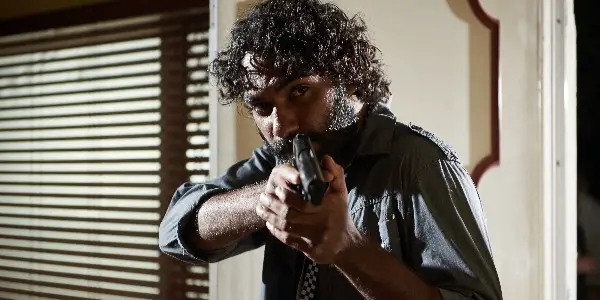In the wake of Adam McKay’s The Big Short, a flurry of films have attempted to replicate its precarious documentary/shaky-cam dramatisation style, re-telling real life injustices with fourth-wall breaking monologues and didactic fact-checking. His film before that though – seemingly his final comedy – The Other Guys, never quite received the same level of pastiche, despite the amount of buddy cop tropes it amazingly nailed – until now.
Hot Fuzz Down Under
KGB (no, not that one) derives its title from the three adjacent Western Australian suburbs: Koondoola, Girrawheen and Balga, with the first initial being the original residence for the web series’ dual writers and directors, brothers Dan and Luke Riches. Unfolding in five rapidly-paced bite sized episodes (the whole series can be clocked in under half an hour), this series introduces us to two members of the titular town’s police force: newly-promoted junior detectives Jack (Clarence Ryan) and Nigel (Bjorn Stewart).
With the foundation of a bumbling buddy-cop comedy, this ABC series aims to skewer Indigenous and non-Indigenous stereotypes with a firm tongue-in-cheek that guarantees that everybody receives the business end of a clever ribbing or sly roasting. The first episode makes its pointed intentions pretty clear, when it opens with an older white woman picking out an Indigenous suspect in an all-white police line-up, despite the fact that she never actually saw the robber – but she assumes that “those people are usually the fastest anyway”. Even for international audiences, this level of socially-aware mocking is relatable – and for some, uncomfortably too real.

The Other Guys comparison is not limited to its self-aware deconstruction of action movie tropes, it’s also that its first episode virtually repeats its first act within a condensed five minute runtime; Jack’s a hothead with a chip on his shoulder, whilst his mis-matched partner Nigel prefers to stay behind his desk and away from danger. This pair are introduced as the betas to the rundown station’s alphas: detective duo (Mark Coles Smith and Jesse Phillips), whose masculine schtick recalls the legendary collaboration of Samuel L. Jackson and Dwayne Johnson from the aforementioned comedy.
Locked and Loaded
Ignoring orders to say off the case, Jack and Nigel decide to investigate a recent meth-lab explosion before their workplace adversaries can swiftly solve it. There’s not much of a mystery to decipher here, but rather a shaggy dog story that allows an indirect way for the ambitious cops to consistently run into their distant relatives – one of the series’ most prevalent running gags – which further descends into playground disputes, marijuana farming VHS tutorials and one hell of a stack of post-procedural paperwork to be filled out later on.
While the Indigenous cops are very much at the center of the action, the series doesn’t belong to them alone. As indicated by the title, this is a farcical illustration of an off-beat Australian community, refashioning its everyday citizens into a diverse supporting cast that populate this satirical adventure. The Riches Brothers‘ empathetic handling ensures a spirited refusal to condescend or insult any of these people; it’s their distinct actions that wholly define their characters, not relying on their race or gender for any hackneyed characterisation.
KGB: Conclusion
While KGB may liberally borrow from The Other Guys at times (the influence, indirect or not, is quite evident), it’s not a bad place to purloin from; this is a short and sweet web series that provides a snapshot of bigger and better things to come, whether it be an extension of this comical universe or a brand new creation, KGB is a slick and confident calling card for a bright future for the Riches brothers.
What are some of your favourite buddy cop films? Let us know in comments!
KGB will be going live on New Year’s Day on YouTube and ABC iview.
Does content like this matter to you?
Become a Member and support film journalism. Unlock access to all of Film Inquiry`s great articles. Join a community of like-minded readers who are passionate about cinema - get access to our private members Network, give back to independent filmmakers, and more.